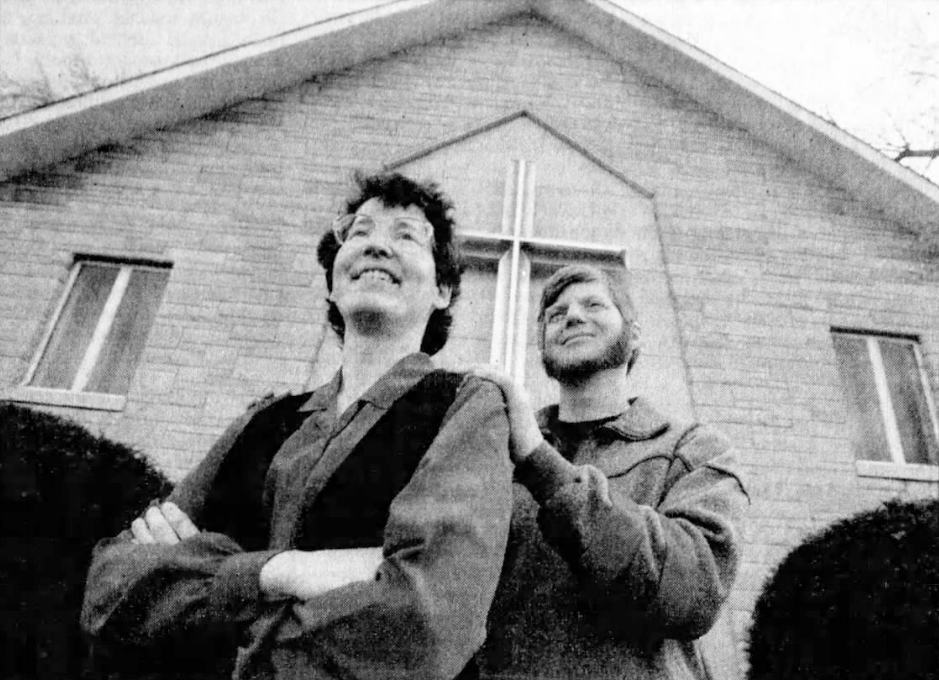By , war tax resistance had almost disappeared from the Church of the Brethren’s Messenger, replaced by vain hopes that the government would pass “Peace Tax Fund” legislation to ease the consciences of troubled taxpayers.

As a supplement to its issue, the Messenger included several-page recap of the first fifty years of the Church of the Brethren General Board, which briefly mentioned the Annual Conference’s vote (754 to 103) to update its peace position in a way that affirmed “tax resistance as a legitimate expression[] of the church’s peace witness” (source).
A letter by James Garber in the same issue started off strong — “We won’t easily pay taxes for war (some won’t pay any taxes for war) just as we won’t put our bodies there” — but then trailed off into a plea to support the Peace Tax Fund legislation. A second letter in the same issue (the writer’s name is obscured in the page scan) has a similarly blunted tone:
The April 15 federal tax deadline presents a recurring religious and moral dilemma for me. The Church of the Brethren has always taught me that “all war is sin,” and that believers should not participate in it.
Although the government no longer wants my body, it still demands my money (about 50 percent of federal income taxes) to pay for wars, past and present. As a conscientious objector to war, I find my deeply held religious beliefs violated by being forced to pay for military activities.
But rather than say he will not go along with such a violation of his deeply held religious beliefs, the writer’s response to this dilemma is just to say that “the government… should… pass the Peace Tax Fund bill.”
A letter from Don Schrader in the issue promoted below-the-tax-line living as a tax resistance strategy (source). Excerpt:
If someone comes to my door collecting money for a local gang to rob and kill my neighbors, would I donate? Would I donate even a dollar if I knew any of the money collected went to kill my neighbors — no matter if the rest of it went to feed the homeless and to build schools?
I keep my taxable income under the taxable level. For a sighted, single person under 65, the taxable level for is $6,800. I lived well in on $5,700.
I am glad to have no car, no big apartment or house, no luxury vacations in order to live under the taxable level. I prize living the truth as best I see it far more than I value unnecessary things. In order for the US to plunder and to massacre, two things are required from many citizens — silence and paying taxes. For 18 years I have paid no federal income tax and I sure as hell am not silent!
An article in the issue, boosting the Peace Tax Fund legislation again, recapped the history of Church of the Brethren with regards to war taxes in the following way (source):
, the Church of the Brethren has openly expressed its opposition to war. During the Revolutionary War, recorded minutes indicate that Brethren were struggling to define what action to take with regard to government conscription and the payment of “war taxes.” The recommendation by the Conference body was to examine one’s conscience and to act as a result of Christ’s leading, with support being given to all those who chose to pay or not to pay taxes.
Some Brethren who paid their taxes would designate the money “for the needy,” but would allow the government to decide ultimately how to use those funds. During the Civil War, the peace churches were successful in convincing the Union to modify its approach to the use of tax revenues. The government agreed to use monies collected as bounty from conscientious objectors for “the benefit of sick and wounded soldiers” rather than for hiring substitutes.
The Church of the Brethren has recently called for the establishment of a World Peace Tax Fund through several General Board and Annual Conference statements.
By supporting the establishment of a Peace Tax Fund, we can lift up an integral part of our Brethren heritage.

Bible Monitor included an article by Dennis St. John on “The Christian and Political Participation” in its issue. The article touched on war tax resistance in an unusually sympathetic way, given the general conservativism of that journal. Excerpts:
What should the Christian’s response be when his convictions conflict with governmental demands? Should Christians use the political process to encourage social betterment? What does the Bible reveal on this issue? How has the Church historically responded to such problems? In the Christian community today there is a great diversity of answers given to these questions.
Historically, there have been several issues in America in which the church has become involved. Slavery, temperance, the peace movement, abortion, women’s rights and gay rights are examples of issues that have affected society-at-large. The church became actively involved and in some instances is still involved. Refusing military service, refusing to pay “war taxes”, and educational issues would be examples of concerns that have more directly involved Christians rather than society as a whole.
Two other issues the Brethren had to deal [at the time of the American Revolution] with were the hiring of substitutes to serve in the rebel militia and the matter of whether to pay taxes that supported the war. Again, we turn to their written records to discover their response.
Inasmuch as at the great meeting in Conestoga last year, it was unanimously concluded that we should not pay the substitute money; but inasmuch as it has been overlooked here and there and some have not regarded it, therefore we, the assembled brethren, exhort in union all brethren everywhere to hold themselves guiltless and take no part in war or bloodshedding, which might take place if we would voluntarily pay for hiring men, or yet more if we became agents to collect such money. But concerning the tax, it is considered that on account of the troublesome times and in order to avoid offense, we might follow the example of Christ (Matt. 17:24–27). Yet, if one does not see it so and thinks perhaps, he for conscience sake could not pay it, but bear with others who pay in patience, we would willingly go along inasmuch as we deem the overruling of conscience to be wrong.
What do we learn from these Brethren? We note their humility and willingness to be subject to “higher powers”. We see that they gave their congregations some firm direction as to a course to follow in those troubling times. We also see their willingness to give some room for individual conscience on the matter of “war taxes”. For their faith and convictions they faced consequences. They had to pay heavy fines in some instances, while others had possessions and properties confiscated by the authorities. There were even some scattered cases of brutality. In the end, they preserved a clear conscience before their God.

